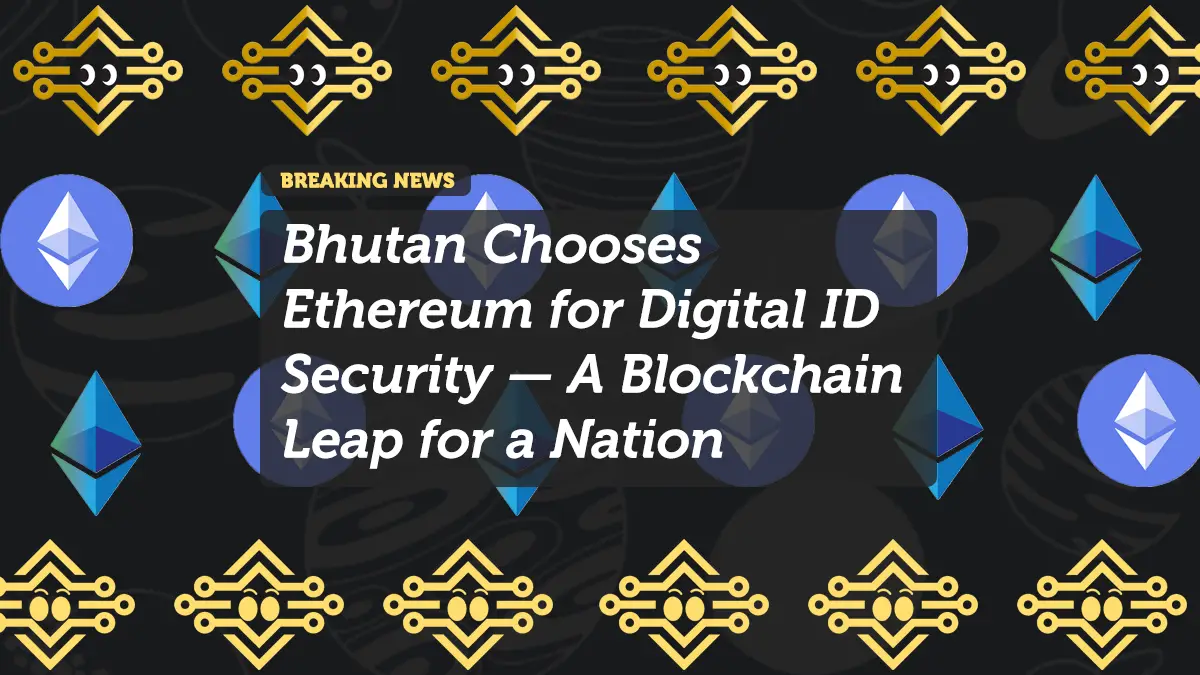
Bhutan Chooses Ethereum for Digital ID Security — A Blockchain Leap for a Nation of Mindful Innovation
In a world where surveillance capitalism and data leaks dominate headlines, the tiny Himalayan kingdom of Bhutan is turning to an unlikely ally: Ethereum.
This serene nation, long celebrated for measuring progress in Gross National Happiness, has quietly launched an ambitious initiative to secure citizens’ identities on Ethereum, positioning itself as a global pioneer in ethical digital transformation.
A Spiritual Nation Meets Decentralized Innovation
According to Bhutan’s Ministry of Home and Cultural Affairs, the project will digitize and authenticate key citizen documents — from national IDs to educational certificates — using Ethereum’s public blockchain.
“Our goal is digital sovereignty with spiritual responsibility,” said Dasho Karma Lhendup, Bhutan’s Chief Technology Secretary.
“Ethereum allows us to maintain transparency and verifiability without surrendering control to centralized tech giants.”
This marks one of the first instances of a nation-state leveraging Ethereum for identity verification, representing a shift away from siloed national databases toward interoperable, cryptographically secure public systems.
Vitalik Buterin Applauds the Move
Ethereum co-founder Vitalik Buterin publicly praised Bhutan’s decision in a post on X (formerly Twitter), calling it a “beautiful alignment between philosophy and technology.”
“Bhutan understands something most governments don’t — blockchains are not about control, they’re about verifiable trust,” Buterin wrote.
Vitalik’s acknowledgment underscores the significance of this move at a time when nations are grappling with the ethical implications of digital identity systems.
Why Ethereum? Transparency Meets Timeless Values
Bhutan’s choice of Ethereum wasn’t accidental. Officials cited several reasons for choosing the world’s most actively developed blockchain:
- Security: Ethereum’s decentralized consensus ensures no single entity can manipulate identity data.
- Interoperability: Smart contracts enable Bhutan’s systems to interact with global applications, from education verification to healthcare.
- Sustainability: Since Ethereum’s 2022 shift to proof-of-stake, its energy consumption dropped over 99.9%, aligning with Bhutan’s carbon-negative policies.
- Public Trust: A transparent ledger offers citizens and institutions confidence that their data cannot be altered or misused.
In essence, Bhutan’s government is betting on Ethereum’s composability — the ability to build secure public-sector infrastructure atop open protocols.
The Architecture: Self-Sovereign Identity on Ethereum
The identity platform, internally named “DrukChain Identity”, leverages Ethereum smart contracts to anchor decentralized identifiers (DIDs) tied to verifiable credentials stored off-chain.
This means Bhutanese citizens will control their own cryptographic keys, maintaining ownership over their personal information while still allowing secure, consent-based verification by schools, employers, or banks.
It’s a vision that mirrors self-sovereign identity (SSI) frameworks championed by Web3 developers — but executed at a national scale.
Bhutan’s Blockchain Ambitions Are Growing
This isn’t Bhutan’s first blockchain experiment. The country has quietly been mining Bitcoin since 2019, using its abundant hydropower to generate clean energy for blockchain operations.
It has also invested through its sovereign fund, Druk Holding & Investments, in blockchain startups focused on green data infrastructure and DeFi experimentation.
The Ethereum-based ID system expands this trajectory — signaling Bhutan’s intent to evolve into a Web3 innovation hub while retaining its cultural emphasis on ethics and sustainability.
Tech Giants Offline, Miners Meditate
In true Bhutanese fashion, the rollout announcement was accompanied by a moment of digital silence, during which officials invited citizens and developers to “reflect on the balance between innovation and mindfulness.”
Across crypto Twitter, memes exploded — from “miners meditating in the Himalayas” to “gas fees paid in karma.”
But beneath the humor lies a serious milestone: a sovereign government choosing open infrastructure over corporate control.
Global Implications
Bhutan’s move could inspire other small nations seeking to modernize without succumbing to surveillance capitalism or dependency on foreign tech vendors.
By anchoring digital identity on Ethereum, Bhutan demonstrates that blockchain can empower citizens, not just traders.
If successful, it may become a template for ethical digital governance — where public goods, not profit motives, define national tech strategy.
Key Takeaways
- Bhutan becomes one of the first nations to use Ethereum for citizen identity.
- The project emphasizes self-sovereign control, sustainability, and transparency.
- Vitalik Buterin calls it a “spiritual alignment” of blockchain and governance.
- The initiative strengthens Bhutan’s position as a global blockchain pioneer.
Final Thoughts
In the rush toward digital centralization, Bhutan has chosen a different path — one rooted in trust, decentralization, and inner balance.
By embracing Ethereum, the kingdom is not just building technology; it’s crafting a digital future that mirrors its deepest values: clarity, harmony, and collective happiness.














